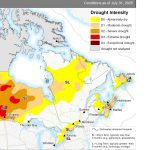Canola futures rose Tuesday bucking a trend to lower prices in other grains.
Weekend rain and cold temperatures in Manitoba and Saskatchewan supported canola. Brandon got about 25 millimetres of rain on May 21 and Morden got 24 mm. Frost warnings are common for tonight for Saskatchewan and Manitoba.
Corn fell three percent as big funds liquidated holdings. They are concerned about the debt problems of some European countries and the expected end of U.S. stimulous policy.
About 80 percent of the U.S. corn crop had been seeded as of May 22, relieving some of the worries about producing a large enough crop to meet demand.
However, that means about 20 million corn acres still need to be sown. The eastern Midwest is forecast to get more rain this week, delaying seeding.
About 41 percent of the U.S. soybean crop had been sown, leaving about 45 million acres to be seeded.
Chicago wheat fell through its 200-day moving average, indicating technical weakness.
Europe was mostly dry over the weekend, lifting European rapeseed futures, but showers are forecast for later this week.
Crude oil rallied, lending some support to grain prices.
Goldman Sachs said in a note that the volatile weather market could still push corn prices higher.
“We still expect near-term upside to corn prices on stronger demand than currently reflected by the USDA. Sustained planting delays would likely increase the upside to corn prices over the next 12 months while reducing our forecast soybean upside,” it said
“For wheat, continued poor weather is creating risks of an even larger global deficit than we currently expect and presents upside risk to our neutral price outlook,” Goldman Sachs said.
Goldman and Morgan Stanley both raised their outlooks for crude oil prices. Goldman Sachs thinks Brent crude will climb to $120 per barrel within six months and to $130 in 12 months.
The Canadian Wheat Board said Western Canadian seeding is now 53 percent complete, compared to 75 percent normally.
Alberta and much of Saskatchewan are seeing close to average progress. Seeding is nearing completion in areas of Alberta, where light showers or five to 20 millimetres were beneficial to recently seeded crops.
Farmers in southern Saskatchewan and Manitoba are struggling to get crop in the ground. Progress in these areas was pushed further back over the weekend by moderate to heavy rain (15-65 mm) that brought seeding to a halt.
Winnipeg (per tonne)
Canola Jul 11 $580.20, up $3.10
Canola Nov 11 $586.00, up $2.70
Canola Jan 12 $592.90, up $2.40
Canola Mar 12 $596.30, up $1.40
The previous day’s best basis was $10 under the July contract according to ICE Futures Canada in Winnipeg.
The July contract’s 14-day Relative Strength Index was 55. The rule of thumb is an RSI of 30 indicates an over sold market and 70 indicates an over bought market
Western Barley Jul 11 $205, unchanged
Chicago (per bushel)
Soybeans Jul 11 $13.7225, down 1.5 cents
Soybeans Aug 11 $13.68, up 0.75
Soybeans Nov 11 $13.5425, up 3.5
Corn Jul 11 $7.3325, down 20.75
Corn Dec 11 $6.625, down 8.0
Oats Jul 11 $3.60, down 1.0
Oats Dec 11 $3.745, down 0.5
Minneapolis (per bushel)
Spring Wheat Jul 11 $9.8875, down 12.25 cents
Spring Wheat Sep 11 $9.755, down 12.0
Spring Wheat Dec 11 $9.79, down 11.0
Light crude oil nearby futures in New York rose $1.89 to $99.59 US per barrel.
The Canadian dollar at noon was $1.0231 US, down from $1.0272 the previous trading day. The U.S. dollar at noon was 97.74 cents Cdn.
The Toronto Stock Exchange composite index closed down 57.15 points, or 0.42 percent, at 13,595.12.
The Standard and Poor’s 500 index dropped 1.09 points, or 0.08 percent, to 1,316.28.










